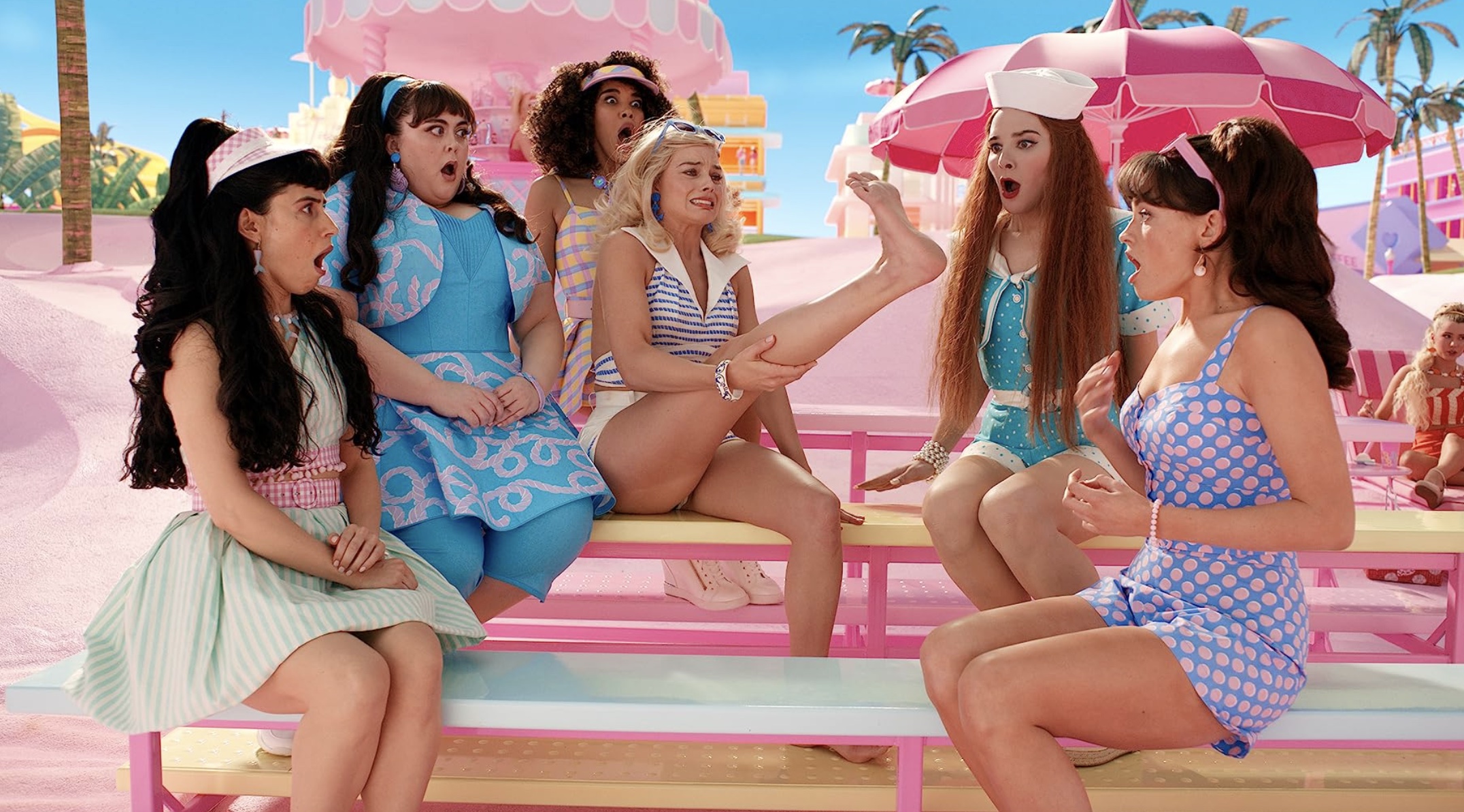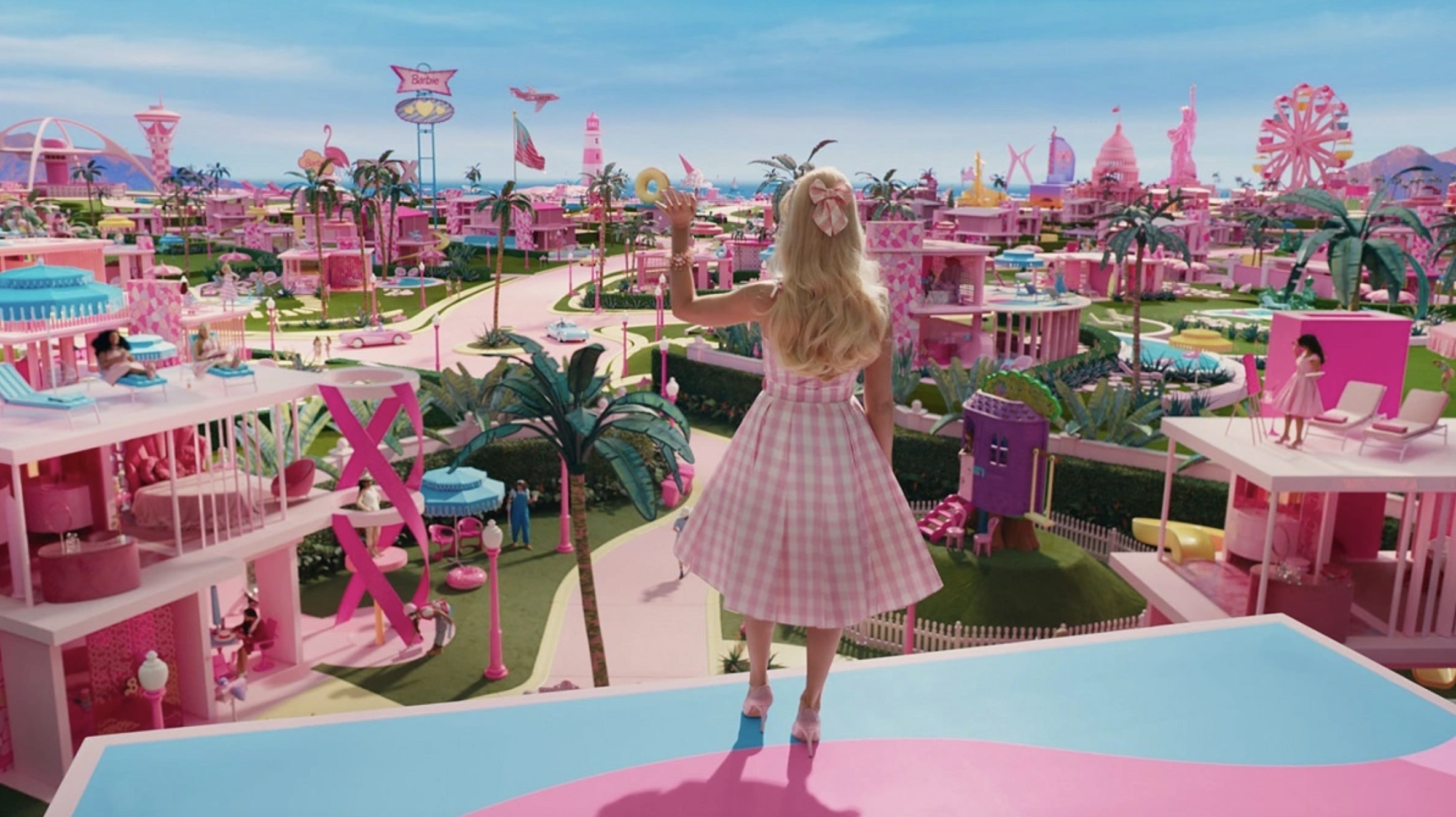Like thousands of people around the world, I made my way to the movie theatre and saw Barbie this past weekend.
My partner and I took my mom out to the Kelowna cineplex (with the recliner seats!) for a Friday matinee showing of Great Gerwig’s bubblegum feminist satire. Despite its early showtime, the theatre was chock full of pink-clad teens snapchatting from the front row throughout the whole movie, a birthday party of identical tweens with ponytails and Barbie shirts and a fair share of adults like us, many wearing their own version of Barbie pink.
And I’ll admit I was hyped too. It’s impossible to have not gotten swept up in the Barbie marketing. From the moment those very extra images of stars Margot Robbie and Ryan Gosling in neon roller skates in Venice Beach emerged last year, I was hooked. Barbie has garnered a rabid cult following in recent months, particularly from queer fans who’ve superimposed our own associations and expectations of the doll over the years (think Trixie Mattel, scissoring Barbies, the piles of weird art we’ve made).
Those same positive feelings were easily projected onto this big-budget blockbuster, particularly in the absence of few details on the plot. Was this going to be a camp spectacle along the lines of The Rocky Horror Picture Show or Valley of the Dolls? Was Gerwig actually going to get away with making a progressive, weird, political Barbie movie for a big studio that’s also a box office smash? The marketing gave us few answers but plenty of hype (and plenty of pink) as the world got everything from Barbie dreamhouse Airbnbs to bright pink Crocs and a massive 3D Barbie at the Burj Khalifa.
Now the film is here, and we can finally judge the thing itself. To start, Gerwig certainly made a blockbuster—the film had a historic opening of its own, smashing records and getting a further lift into the record books in conjunction with Oppenheimer and the “Barbenheimer” phenomenon. It could very well end the year as the highest-grossing film of 2023 and garner Oscar buzz, particularly for its creative team, and Ryan Gosling as Ken.
Barbie follows Margot Robbie’s titular doll, as her perfect life in Barbieland is disrupted by thoughts of death. She sets out to find her owner in the real world who could be the cause, with Gosling’s Ken in tow, and ends up combating the patriarchy and coming into her own humanity with the help of a Mattel worker (America Ferrara), her daughter (Ariana Greenblatt), a “weird Barbie” (Kate McKinnon) and a host of other dolls. It’s a lot! There are dance numbers, gynecology, dream sequences and a bangin’ soundtrack!
There are also a lot of attempts to say something. Like much of her past work, including Lady Bird and Little Women, Gerwig has not shied away from identifying Barbie as a feminist film, particularly as an attempt to reckon not only with the doll’s complicated history for women, but also with capitalism.
To that end, it’s fitting that we got a film like Barbie just as Twitter seems to be entering the tighter rings of its death spiral, as the film is ripe with the sort of discourse Twitter loves. On release day, NBC published the article “Turns out, Barbieland isn’t as gay as its queer fans had hoped,” while Twitter was full of contrary takes: that the film was not trans enough, that is was secretly a full-on trans allegory, that it was not gay enough and that it was actually super super gay.
Taking the film on its surface and what Gerwig is trying to accomplish when it comes to feminism, it’s only partially successful as a progressive opus. The film’s been praised for its feminist messaging, but it’s also a film that ends up enforcing a strictly defined gender binary between Barbies and Kens. Men are one way (unless you’re Michael Cera’s queer-coded Allan) and women are another. The differences between Barbies and Kens are hammered home over and over and over, and in this current moment of attack on trans and gender-diverse folks, this sort of essentialist division is not particularly the brand of feminism I’m clamouring for.
Elsewhere, the ultimate message taken away from Ken’s transgressions—that the patriarchy is fuelled by men who just need to get more in touch with their feelings—is certainly accurate, but far from the easy answer it’s presented as in the film. And while the cast of Barbies checks diversity boxes on paper—Issa Rae as President Barbie! Openly trans actress Hari Nef playing a Barbie! The great Sharon Rooney as a visibly plus-size Barbie!—there is little to no conversation about intersectionality, or the different ways women of different experiences move about the world, amidst all of Barbie’s feminist opining.
Similarly, an undercurrent throughout the film is the Barbies’ general distaste with any sense of romance with their prescribed Ken boyfriends. And yet while the homoeroticism of the Kens is at least hinted at with a cheek kiss or angry homoerotic dance here and there, the concept of the Barbies loving each other is never even dipped into—despite the long history of baby queers scissoring their Barbies together!
And to be clear: I don’t need Rae’s President Barbie breaking down the extra barriers Black women face to succeed under capitalism, nor do I need Nef’s Doctor Barbie to be canonically trans and give an impassioned monologue about dolls being for the dolls or Rooney’s Lawyer Barbie to talk about self-love. This is, after all, a PG-13 movie with a lot to get through and a lot of expectations riding on it. In trying to be an easy-breezy, under-two-hours studio comedy, it’s unreasonable to expect some Judith Butler–level of philosophizing or even an Instagram infographic level of feminism.

Ryan Gosling and Margot Robbie as Ken and Barbie in “Barbie.” Credit: Courtesy Warner Bros.
And I don’t mean to come across as a party pooper when it comes to Barbie—I had a blast at Barbie! The production design is out of this world, the costumes are stunning and the cast across the board—but particularly Gosling and Robbie—is a delight. I laughed a ton, and was touched by both the film’s weirder and more tender moments (that final line!). Phrases like “mojo dojo casa house” or “do you guys ever think about dying?” are just in my lexicon now. And it does some truly weird things (everything to do with Rhea Perlman’s role as a figure from Barbie’s past, and also that Ken musical number) that wouldn’t fly in every studio comedy.
Gerwig’s film tosses a LOT of ideological balls in the air, and makes them accessible to a wide swath of audience. Its explorations of motherhood, of the concept of adult play, of humanity and identity, all hint at something interesting. I’m sure the 10-year-olds in my theatre have never heard the word “patriarchy” so many times in such a short span, and I’m sure they took away an important message of empowerment from Ferrara’s much-praised monologue late in the film.
But all of those things end up feeling as hollow as a Ken doll’s head because they aren’t given room to breathe, and get muddled by the aforementioned messy feminism. Take this line, which has already been memed and debated its fair share online:
“We mothers stand still so our daughters can look back to see how far they’ve come.”
That’s interesting! The concept of parental sacrifice, particularly from mothers to “daughters,” is an interesting idea in 2023, and interesting viewed through an intersectional lens. And yet it gets barely any airtime in the film, particularly any attempts to thematically link that idea in Barbie’s journey to Ferrara’s character. And that’s simply because there’s no time or bandwidth.
Rather than pick a few core themes to really go deep on and say something meaningful about, Barbie tries to do everything. And as a result, ultimately much like the doll it’s based on, Barbie is best viewed as a blank slate for us to read our own meanings into. Barbie can be a doctor or president—or a lesbian if you’re willing to spread those legs and scissor two of them together. She can be a feminist icon, if you don’t think too hard about her history of objectification and unreachable beauty standards.
In the same way, Barbie can be about feminism broadly, the sacrifices of motherhood, grief, queerness or trans womens’ journey of self-discovery, if you look hard enough. Many trans women online have found meaningful (and humorous) readings into Barbie’s final emergence into the real world and first trip to the gynecologist, just as many gays have seen themselves in Cera’s Allan, who sides with the Barbies against the Kens. My mom loved the storyline around Ferrera and her daughter, while, as a transmasc person, I found some interesting things in the film’s portrayal of performative masculinity.
This film can be a queer outfit inspo if you don’t look too hard at its messy feminism, just as it can be an inspiring feminist manifesto if you don’t think too hard about how it’s a multimillion-dollar blockbuster purporting to be a critique of capitalist patriarchy and yet still intent on making a bajillion dollars and selling a shitload of toys.

Ana Cruz Kayne, Margot Robbie, Alexandra Shipp, Sharon Rooney, Hari Nef, and Emma Mackey all play various Barbies in the film Credit: Courtesy Warner Bros.
And that’s what it ultimately comes down to. As much as Mattel may claim otherwise, Barbie the movie exists to make money. And in a moment where the last dregs of its press cycle were cut short by justified labour action from the Hollywood actors’ union, that feels all the closer to the surface. The same goes for this moment where feminism, queerness, transness and more are increasingly commodified because the people in charge (aka the patriarchy, as defined in Barbie) have finally decided that those things are profitable.
While Gerwig’s film tries to cheekily dig at all that (late in the film, a Mattel exec decides to endorse a “regular person” Barbie as soon as a computer says it’s profitable), Barbie has still made over $400 million dollars in just four days. Millions of dollars were spent to get us hyped for this movie, to make us feel that connection to its aesthetic or its themes or its politics. And it worked! I’ve got my little Barbie outfit, I’ve embraced the memes, and I’ve listened to the soundtrack at least a dozen times at the gym since it dropped (that Charli XCX song is a banger!). I was primed to receive whatever Barbie threw at me.
The feminist and progressive messages in Barbie are designed to toe a line, but not cross it—to be just edgy enough to be profitable, but not so edgy as to alienate its giant audience. Some on the left might even argue that all activism should aim for that, to rope in that wide expanse of the undecided centre. Others would say we shouldn’t compromise our politics for broad appeal. I personally fall a bit more in the latter camp; Barbie certainly falls in the former. And if I had to come down on one side or another, I’d say that’s okay.
Barbie is a fun movie. It’s a technical marvel with heart from a female auteur. It’s worth celebrating and, more than anything—just like the doll herself—it can be what we want it to be.


 Why you can trust Xtra
Why you can trust Xtra


